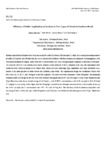Please use this identifier to cite or link to this item:
http://www.alice.cnptia.embrapa.br/alice/handle/doc/1003795Full metadata record
| DC Field | Value | Language |
|---|---|---|
| dc.contributor.author | MOREIRA, A. | pt_BR |
| dc.contributor.author | SFREDO, G. | pt_BR |
| dc.contributor.author | MORAES, L. | pt_BR |
| dc.contributor.author | FAGERIA, N. | pt_BR |
| dc.date.accessioned | 2014-12-29T11:11:11Z | pt_BR |
| dc.date.available | 2014-12-29T11:11:11Z | pt_BR |
| dc.date.created | 2014-12-29 | pt_BR |
| dc.date.issued | 2014 | pt_BR |
| dc.identifier.citation | In: WORLD CONGRESS OF SOIL SCIENCE, 20., 2014, Jeju. Soils embrace life and universe: [abstracts...]. Jeju: International Union of Soil Sciences, 2014. | pt_BR |
| dc.identifier.uri | http://www.alice.cnptia.embrapa.br/alice/handle/doc/1003795 | pt_BR |
| dc.description | Modern agricultural techniques have been increasing the yield of soybean (Glycine max L.) while also causing increasing removal of sulfur (S) from the soil. Besides this, the use of concentrated fertilizers with this element and inadequate soil management, with consequent formation of organic matter with low S concentrations, has been causing frequent symptoms if deficiency in the plats. To assess the effect of S on soybean yield and to establish critical levels of S-SO42- available in the soil, two experiments were conducted over a two-year period in the Parana State, Brazil, in fields containing Typic Haplorthox and Typic Eutrorthox soils, located in the municipalities of Ponta Grossa and Londrina, respectively. The experimental design was randomized blocks with five S rates (0, 25, 50, 75, and 100 kg ha-1) and four replicates. The source used was elementary S with 98% purity. The maximum estimated yields on average for the two years were obtained with application of 49.9 and 63.0 kg ha-1 in the Typic Haplorthox and Typic Eutrorthox soils, for an overall average of 56.4 kg ha-1, with S-SO42- concentrations in the 0-20 cm depth of 16.9, 19.3 and 17.1 mg kg-1, respectively, values higher than the 10 mg kg-1 indicated as the adequate concentration for soybean plant. In turn, at the 21-40 cm depth, the S concentrations were 49.5, 74.2 and 56.4 kg ha-1. The efficiency of the fertilization diminished with increasing S rates, in both soil types, while the greatest yield efficiency was obtained in the plants grown in the Typic Haplorthox soil. | pt_BR |
| dc.language.iso | eng | eng |
| dc.rights | openAccess | eng |
| dc.title | Efficiency of sulfur application on soybean in two types of Oxisols in Southern Brazil. | pt_BR |
| dc.type | Resumo em anais e proceedings | pt_BR |
| dc.date.updated | 2014-12-30T11:11:11Z | pt_BR |
| dc.subject.thesagro | Soja | pt_BR |
| riaa.ainfo.id | 1003795 | pt_BR |
| riaa.ainfo.lastupdate | 2014-12-30 | pt_BR |
| dc.contributor.institution | ADONIS MOREIRA, CNPSO; GEDI JORGE SFREDO, CNPSO; LARISSA ALEXANDRA CARDOSO DE MORAES, CNPSO; NAND KUMAR FAGERIA, CNPAF. | pt_BR |
| Appears in Collections: | Resumo em anais de congresso (CNPSO)  | |
Files in This Item:
| File | Description | Size | Format | |
|---|---|---|---|---|
| EfficiencyofsulfurapplicationonsoybeanintwotypesofOxisolsinSouthernBrazil.pdf | 125,5 kB | Adobe PDF |  View/Open |









